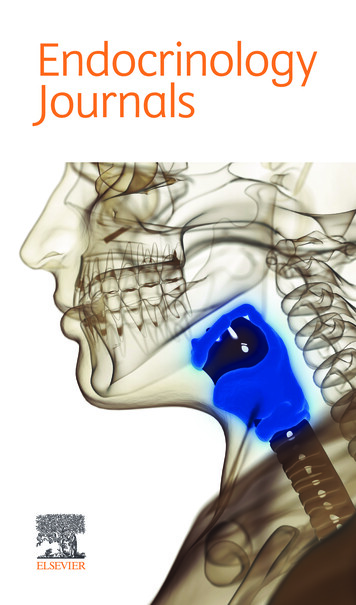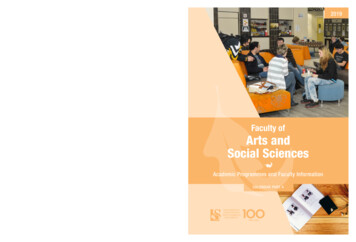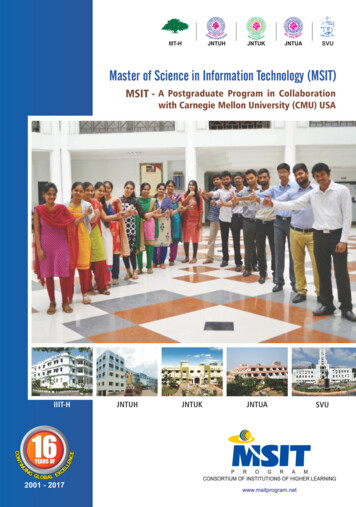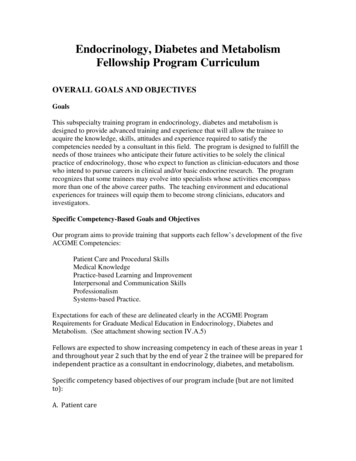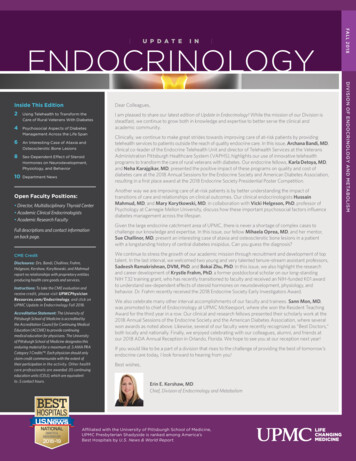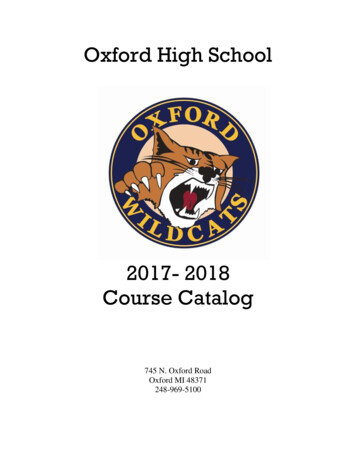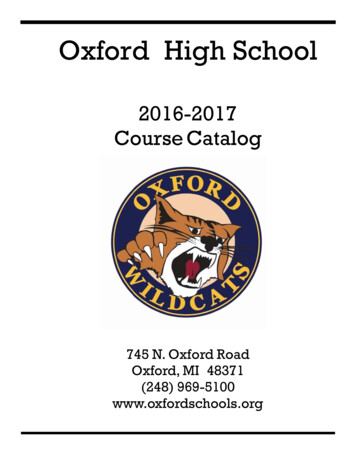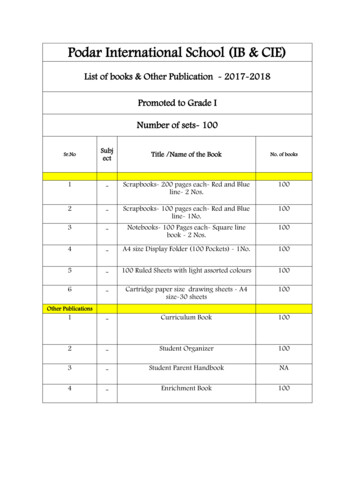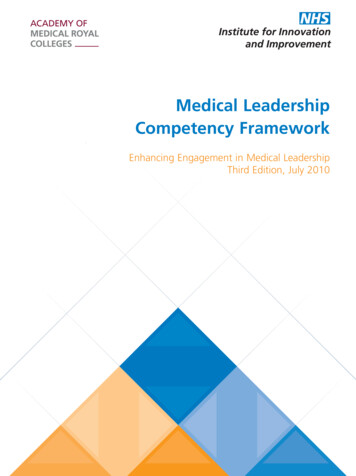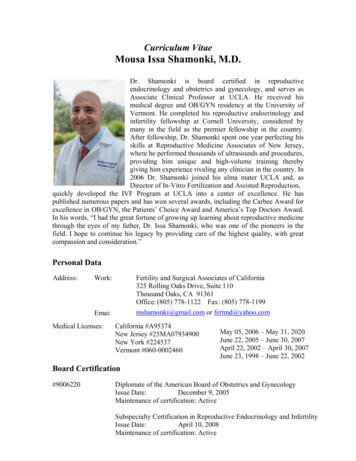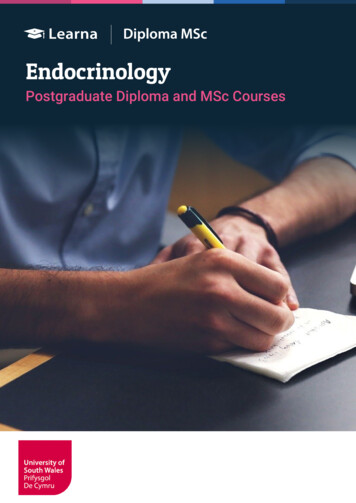
Transcription
EndocrinologyPostgraduate Diploma and MSc Courses
Postgraduate DiplomaMScDelivered over 1 year, the online, part-time,Postgraduate Diploma course is speciallydeveloped for busy health professionals.Formatted in 6 modules, each 6 weeks induration; the course is designed to bepractical and clinically focused.The MSc runs over 1 calendar year, starting withan initial 12 week online module to develop theirskills in critical appraisal and knowledge ofresearch methodologies. Students then completethe professional project module which consistsof a 1,500 word proposal and 10,500 wordprofessional project.Why Study Endocrinology with us?Taught completely online, our Endocrinologycourse aims to create professionals who canindependently access information and use theinformation to improve understanding ofendocrine care. It will prepare students to takea leadership role in the global context ofendocrinology.The Postgraduate Diploma and MSc coursesare aimed at General Practitioners, PracticeNurses and Specialist Nurses. These roles areevolving with increasing demand amongstthese specialists for a postgraduatequalification to help support their professionallearning and clinical development.The courses are designed to be relevant to allhealth professionals who have exposure topeople with endocrine related disorders and isparticularly relevant to Specialist Registrars,Endocrine Nurses and those.Students may apply for the MSc inEndocrinology as a two year course, year onebeing the completion of the PostgraduateDiploma (120 credits), followed by second yearas the MSc (60 credits).Endocrinology: Postgraduate Diploma and MSc Courses2
Endocrinology Postgraduate DiplomaCourse ModulesOur online Endocrinology Postgraduate Diploma allows you to study for just one calendar yearand is a part-time, distance-learning course. The course is worth 120 credits and comprises sixmodules of 20 credits, each running over a period of six weeks.Module 1 - Disorders of theHypothalamus and PituitaryAim of the module:To understand the physiological principlesof the hypothalamic pituitary axes.To understand the common disordersaffecting the hypothalamus and pituitary.On completion of this module, students will be able to:1. Apply knowledge of the physiologicalprinciples involved in the hypothalamicpituitary- end organ axis and patho-physiologyto a range of endocrine disorders.2. Critically evaluate the presentation, diagnosisand management of patients presenting withdisorders of the hypothalamus and pituitary.Synopsis of module content:Basic physiology of the hypothalamic-anteriorpituitary-end organ axes together with anunderstanding of the posterior pituitary.Module 2 - Disorders ofthe ThyroidStudy of the various anterior and posterior pituitaryhormones plus hypothalamic signals.Aim of the module:Hormonal signalling including intracrine, paracrineand endocrine effects together with secondmessenger effects.Non-functional pituitary tumours – presentation,diagnosis, investigation and management includingmedical and surgical approaches. Surveillance ofpituitary tumours.Functional pituitary tumours – presentation,investigation and management including medical andsurgical approaches.Hypopituitarism.Endocrine investigations used in the assessment ofthese disorders including the oral glucose tolerancetest, insulin tolerance test, short synacthen test, waterdeprivation test and dexamethasone suppressiontesting.Endocrinology: Postgraduate Diploma and MSc CoursesTo apply an understanding of thephysiology of the thyroid and its hormonesto critical awareness of the diagnosis andmanagement of disorders of the thyroid.Synopsis of module content:The physiology of the thyroid gland, basicscontrol of hormonal secretion and the effects ofthyroid hormones. Thyroid function tests andinterpretation. Sick euthyroidism and nonthyroidal illness. Thyroiditis includingDeQuervain’s thyroiditis. Thyroid eye disease.Hypothyroidism – presentation, diagnosis andmanagement. Causes of hypothyroidism.Principles of thyroid hormone replacement andmerits of T4 and T3 replacement.3
Hyperthyroidism – presentation, diagnosis andmanagement. Causes of thyrotoxicosis – Graves’disease, Multinodular goitre and drugs.Management of hyperthyroidism – surgery, drugsand radio-iodine. Preparation of the thyrotoxicpatient for surgery.Use of thionamides, side effects and managementof thionamides. Use of radio-iodine, outcomes andcontra-indications to its use. Thyroidectomy,outcomes and potential risks of surgery.Management of the patient presenting with athyroid nodule. Fine needle aspiration andclassification of the aspirate.Synopsis of module content:Physiology and pathophysiology of the adrenalmedulla and cortexHormonal secretion of the adrenal medulla andcortexSynthesis of the adrenal cortical hormonesInvestigation of the adrenals –short synacthentesting, dexamethasone suppression testing,urinary catecholamines, plasma renin activity andaldosterone testing.Sensitivity/specificity of testsOn completion of this module, students will be able to:Adrenal hypersecretion1. Critically appraise disorders of thethyroid with reference to theunderlying physiology.Adrenal dependent Cushing’s disease – diagnosisand management including medical and surgical2. Demonstrate critical clinical decisionmaking skills relating to the diagnosisand management of patients withthyroid disorders.Conn’s syndrome and primary hyperaldosteronism– diagnosis and management including medicaland surgical. PRA – Aldosterone ratioApparent mineralocorticoid excess and Liddle’ssyndromeModule 3 - Disorders ofthe AdrenalsPhaeochromocytoma – diagnosis andmanagement.Adrenal and extra-adrenal phaeochromocytoma.Aim of the module:To facilitate an improved understanding ofthe physiology and pathophysiology of theadrenal glands in relation to endocrinedisorders of the adrenal glands.Utility, sensitivity and specificity of urinarycatecholamines and MIBG scintigraphy.Genetic conditions associated withphaeochromocytoma – MEN Type 2, SDH B and D,Von Hippel Lindau and NeurofibromatosisLittle did I know that the MSc was going to be a significant stepping stone in mymedical career! Both the diploma and MSc were invaluable in terms of expandingmy knowledge and management of Diabetes Medicine, but also enhanced mycritical thinking and writing skills.- Dr Kevin FernandoEndocrinology: Postgraduate Diploma and MSc Courses4
HyposecretionCongenital adrenal hyperplasia – classical, nonclassical, investigation, diagnosis and managementAddison’s disease – presentation, diagnosticstrategies, management including adequatereplacement therapiesAcute hypoadrenalism – emergency treatment andappropriate advice to the patientAdvising the patient relating to the titration ofsteroid therapy during illnessGlucorticoids, relative potency, mechanism of actionMineralocorticoids, mechanism of action andanatgonistsModule 4 - Disorders ofParathyroids, Calcium and BoneAim of the module:To link the understanding of physiologyand patho-physiology with the clinicalmanagement of endocrine disorders ofparathyroid, calcium and bone.Synopsis of module content:Hypocalcaemica, investigation andmanagement.Primary hyperparathyroidismSecondary hyperparathyroidismSafe withdrawal of steroid therapyInvestigation of bone mineralisation andinterpretation of dual energy absorptiometry –DEXAThe adrenal noduleOsteoporosisAssessment of functionalityStrontium Ranelate, SERMS, Vitamin D andCalcium, Bisphosphonates and CalcitoninMonitoring and radiological investigationManagement including appropriate surgical referralContinued on next pageOn completion of this module, students will be able to:1. Demonstrate post-graduate level ofknowledge of the pathophysiology of avariety of conditions affecting theadrenal glands2. Demonstrate critical clinical decisionmaking skills in relation to themanagement of a variety of conditionsaffecting the adrenal glands"When I enrolled into the course I had noidea about the opportunities it wouldprovide me with. Having my first paperpublished through this course helped meovercome my apprehensions ofacademic writing and made me moreconfident to pursue it further. "- Rutu DaveEndocrinology: Postgraduate Diploma and MSc Courses5
Secondary hyperparathyroidismSynopsis of module content:Investigation of bone mineralisationand interpretation of dual energyabsorptiometry – DEXABasic physiological principles of the ovaries andOsteoporosisPolycystic ovarian SyndromeStrontium Ranelate, SERMS, Vitamin Dand Calcium, Bisphosphonates andCalcitoninInvestigation of male and female infertilityOn completion of this module, students will be able to:testes Genetic disordersManagement of the endocrine aspects of male andfemale infertilityReferral criteria for fertility units1. To investigate disorders of calciummetabolismFemale hypogonadism2. Demonstrate knowledge and skills inthe management of patients withdisorders of calcium and parathyroiddisordersMale hypogonadismOn completion of this module, students will be able to:3. Demonstrate an ability to investigateand manage patients presenting withosteoporosis1. Demonstrate competence in therecognition and management of theendocrine disorders of the gonadsModule 5 - ReproductiveEndocrinology2. Understand the principles ofinvestigating and managingendocrine related fertility issuesAim of the module:To provide an overview of the physiologyand pathophysiology of reproduction withreference to the endocrine systemTo review the evidence base and applystrategies for the investigation, diagnosisand management of patients presentingwith endocrine disorders of ovaries andtestesModule 6 - EndocrineRelated CancerAim of the module:To gain an in-depth understanding of thepresentation, investigation, diagnosis andmanagement of endocrine-related cancers.To provide an overview of theinvestigation, diagnosis and managementof patients failing to conceive due toendocrinopathy.Endocrinology: Postgraduate Diploma and MSc Courses6
Synopsis of module content:Thyroid cancer including follicular, medullaryand anaplastic thyroid cancerAdrenal CancerNeuroendocrine Tumours (NETs)On completion of this module, students will be able to:1. Critically appraise the evidence relatingto the management of patents withendocrine related cancers.2. Demonstrate competence in thediagnosis and management of patientswith endocrine related cancers.3. Develop an improved approach to theinvestigation and management ofpatients with Neuroendocrine Tumours.Teaching MethodsOur courses are conducted entirely online throughself-directed distance learning. However, you willreceive guidance throughout with tutor-stimulatedacademic discussions, which are based onclinically-rich case scenarios. These usually occurwithin groups of 10-15 students, allowing you toclearly communicate with both your tutor andfellow students.You will participate in a combination of group andindividual activities, which are recorded in areflective journal. This innovative teaching methodenables you to envisage the translation of yourstudies into your every day work and practice.Our dedicated Student Support Team are alsoavailable to help with any problems you may face.From navigating our online platform to advisingyou on deadlines, our team can assist with anyquestions or challenges you may have along theway.Study skills weekOnce you have secured your place on the course,you will be invited to a Study Skills weekwebinar. This will give you the opportunity toparticipate in workshops on Harvard referencing,scientific and reflective writings, and levels ofevidence in preparation for your studies. It is notcompulsory for you to attend our Induction Daybut it is recommended, as it'll provide you with asturdy introduction to the course.Endocrinology: Postgraduate Diploma and MSc Courses7
Endocrinology Postgraduate DiplomaEntry RequirementsDocuments required:A copy of your updated CV including youraddress and date of birth.A copy of your undergraduate degreecertificate.The name and email address of someonewho is able to provide a reference, this can bea work colleague, employer or former tutor.A detailed personal statement explaining whyyou would like to undertake the course.Health professionals working within a clinicalsetting, both UK and overseas, with a relatedHealthcare Science degree (includinginternational qualifications) are eligible toapply for the Postgraduate Diploma inEndocrinology.Applicants without the above academiccriteria but relevant/ suitable experience canapply. Applications will be judged on theindividual specifics of background andqualifications including ability to work atPostgraduate level (applicants may be askedto submit a piece of work for assessment toconfirm that they are able to workcomfortably at postgraduate level anddemonstrate requisite clinical/professionalknowledge).Applicants should submit copies of the followingwith their application:Proficiency in the English language is alsoessential to completing our courses. If Englishis NOT your first language, we ask for proof ofcompetency during the application process.We are able to accept an IELTS overall scoreof 6.0 (with a minimum of 5.5 for each band)or an equivalent qualification.Endocrinology: Postgraduate Diploma and MSc Courses8
Endocrinology MScCourse ModulesModule 1 - Research Methodologiesand Critical AppraisalAim of the module:To help students recognise, understand, interpret andapply methods used in healthcare research.Understand, interpret and apply basic statistics andepidemiological terms.On completion of this module, students will be able to:1. Interpret research and critically appraiseresearch methods used in endocrinology.2. Display a critical understanding of theclinical implications of research and itsimpact upon healthcare delivery and servicedevelopment.3. Implement evidence-based medicine inclinical practice.Understand and critically appraise thevarious methodologies specific to endocrine research.Understand and critically appraise the various studiesused in clinical and scientific research such as singleblind studies, double blind placebo controlled studiesand meta-analyses.Synopsis of the module:Basic terminology used in epidemiology and researchstudies such as prevalence, incidence, sensitivity,specificity, false positive and false negatives.Interpreting graphical representation ofepidemiological and statistical data such as KaplanMeier Curves, Forrest Plots and Meta-analyses.Calculations used in the assessment of research datasuch as relative risk, absolute risk, number needed totreat.Basic statistical tests and their applications includingT-Tests, ANOVA, Chi-Squared Tests.Module 2 - Professional ProjectAim of the module:Develop an ability to critically appraise areas ofhealthcare practice and delivery.Critically appraise specific areas of clinical,research, clinical governance and organisationalpractice.Display skills in independent research and study.Display skills relevant to independent production ofscientific publications.Synopsis of the module:The professional project must be endocrinologyrelated and relevant to the person's practice.This project may comprise:Methodologies used in endocrine research such asinsulin tolerance testing, short synacthen testing,OGTT, measures of insulin resistance and GH testing.Literature review and appraisal of the evidence.Research on issues such as health outcomes andquality of life using bespoke questionnaires such as theSF-36 as well as other modes of assessment.Review and implementation of evidence-basedpractice.Audit of practice including organisational or clinical.Fundamentals of evidence-based practice and itsapplication into the clinical setting.Qualitative or quantitative research (formalresearch involving human subjects is notanticipated).Establishing patient registers and the value of diseasespecific registers.Case-based and quality of service review withcritical appraisal.Research into educational principles for both doctorand patient. Understanding what may work for thepatient as well as the educator.Case report, review of literature and organisationalassessment.Endocrinology: Postgraduate Diploma and MSc CoursesContinued on next page9
On completion of this module, students will be able to:1. Produce an extensive piece of literaturewhich may be suitable for peer-reviewedpublication.2. Demonstrate an ability to critically evaluateresearch in clinical practice and implementimprovements.3. Critically evaluate practice and suggestimprovements or change.4. Incorporate knowledge of the researchprocess in developing services appropriately.Teaching MethodsModule 1 - Research Methodologies andCritical AppraisalMSc teaching methods for this module aresimilar to the Postgraduate Diploma coursemodules, however it is run over 12 weeks.Entry RequirementsEntry to the one year Endocrinology MSc will requiresuccessful completion of the EndocrinologyPostgraduate Diploma (120 credits). This can be fromDiploma MSc, the University of South Wales or anotherUK university (having completed similar modules). Wecan discuss this with you during your application.Individuals who have not completed the postgraduatediploma can apply for the Endocrinology MSc as a twoyear course consisting of eight modules (180 credits)with the first 120 credits deriving from thepostgraduate diploma.Entry requirements for the two-year course are as forthe postgraduate diploma.Applicants should be working in a clinical setting, eitherin the UK or overseas, and have a science degree in arelevant subject.You will also need to submit copies of the followingwith your application:Qualification certificatesModule 2 - Professional ProjectTo produce the professional project, studentscontinue to use the online course; howevermuch of the work is self-directed.Students are expected in the first 8 weeks tointeract with their tutor on a weekly basis.Students select a specific project and submit aproject summary/ proposal (approximately1,500 words).Once the proposal has been approved, theprofessional project (10,500 words) itself isthen completed through online guidance andsupervision offered by the tutor. The studentand tutor will interact regularly (weekly) on thededicated students/ tutor discussion area orthrough any other means of communicationdeemed appropriate by both parties(telephone/ SKYPE/ email). Note of any verbalcommunication with the tutor is recorded in thestudent's journal by the student.Endocrinology: Postgraduate Diploma and MSc CoursesA maximum of two professional and/oracademic referencesIELTS score of 6.0 with a minimum of 5.5 foreach band (or an equivalent qualification)Graduates of this course willreceive a Master of Scienceaward from the University ofSouth Wales, Diploma MSc'scollaborative partner. TheEndocrinology MSc courseprovides a progression route forthe Postgraduate Diplomacourse in Endocrinology.10
What do our students think?Since 2010, over 1000 students have progressed their medical career by enrolling in one of ourqualifications. We ourselves have learned a lot during this time and continually seek to improve thestudent learning experience. Here is what some of our previous students have said:"I found the online learning veryinteresting. It enabled me to savemoney and time.""I found learning with Diploma MScinteresting, it helped to update myacademic knowledge."Dr Imad Eddin Rahamtalla, DoctorDr Prasanth Kinattupurayil, Doctor"I strongly recommend Diploma MSc toall those busy physicians who areworking in remote areas and wish toupgrade their knowledge.""I love that it was flexible and that Icould log in at my convenience. I foundthis course to be very in-depth,informative, challenging andstimulating."Dr Junaid Zaffar, Diabetologist"The learning was fun and enjoyable.The course was awesome and itincreased my confidence."Kerri-Ann Best PGDip, RDDr Sankar Nath Jha, AssistantProfessorEndocrinology: Postgraduate Diploma and MSc Courses11
https://www.facebook.com/DiplomaMScTo apply now visit: chttps://twitter.com/DiplomaMScFor more information on applications emailadmissions@learna.ac.ukor call 44 (0) 29 2192 1312
Endocrinology Postgraduate Diploma Course Modules Our online Endocrinology Postgraduate Diploma allows you to study for just one calendar year and is a part-time, distance-learning course. The course is worth 120 credits and comprises six modules of 20 credits, each running over a
